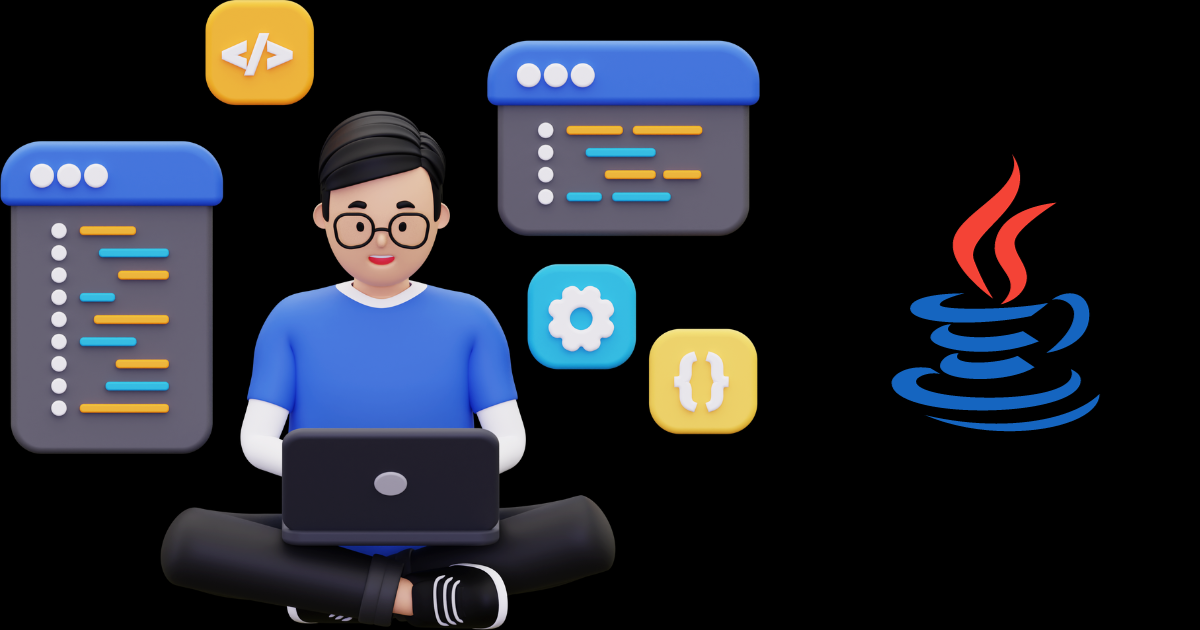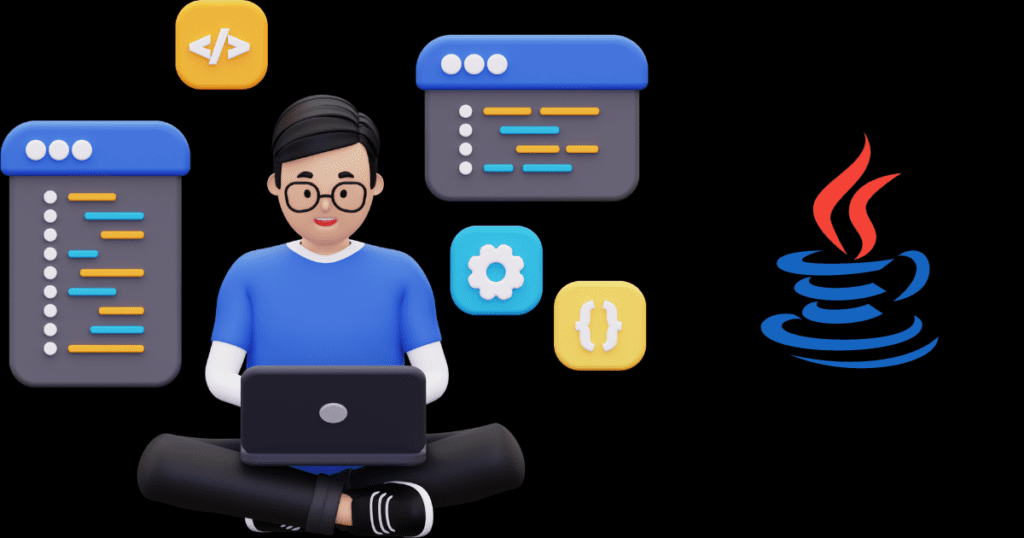Introduction
In the vast universe of programming languages, “What is Java used for?” emerges as a stalwart, weaving a tapestry of possibilities since its inception in the mid-1990s. Java became the cornerstone of software development, deriving from a vision to create a language that could be platform-independent, secure and flexible.
This blog post aims to explore the intricacies of Java and answer the question “What is Java used for?” by delving into its key features, applications across various domains, tools, challenges, and future trends.
What is Java?
Java, at its core, is a high-level, object-oriented programming language developed by James Gosling and his team at Sun Microsystems in the 1990s. It’s specifically designed for portability, allowing developers to write code that can be run on any device with a compatible Java Virtual Machine. This unique feature, along with its emphasis on readability, scalability, and security, answers the question “What is Java used for?” and has propelled Java to the forefront of modern software development.
Key Features of Java
Platform Independence:
Java’s claim to fame is its “Write Once, Run Anywhere” mantra, answering “What is Java used for?”. The Java Virtual Machine JVM enables Java code to run on any device with a compatible JVM, regardless of the underlying architecture. The bytecode generated during compilation is an intermediary language, providing unparalleled portability.
Object-Oriented Programming:
Java embraces the object-oriented paradigm, answering “What is Java used for?” by fostering modular and scalable code. The use of objects allows developers to structure their programs in a way that mirrors real-world entities, promoting code reusability and maintainability.
Robustness and Security:
Java’s robustness is evident in its strict compile-time and runtime checking mechanisms, directly addressing the question “What is Java used for?”. The language is intended to detect errors before they get into production, decreasing the risk of runtime crashes. Java’s built-in security features, such as the classloader and security manager, also create a protective barrier against malicious attacks.
Automatic Memory Management (Garbage Collection):
Java takes the headache out of memory management through automatic garbage collection, another key aspect answering the question “What is Java used for?”. This process identifies and removes unused objects, preventing memory leaks and allowing developers to focus on writing code rather than managing memory allocations.
Multithreading:
Multithreading is critical to modern software development, answering “What is Java used for?”. Java supports multithreading, allowing developers to develop reliable and effective applications capable of performing multiple tasks simultaneously.
Java Applications
Web Development:
Java is a cornerstone of web development, actively answering the question “What is Java used for?”. Technologies like Servlets and JavaServer Pages (JSP) drive the backend logic of many web applications. Frameworks such as Spring and Struts simplify the development process, offering a structured approach to building scalable and maintainable web solutions.
Mobile Applications:
Android, the world’s most popular mobile operating system, heavily relies on Java for app development, directly answering the question “What is Java used for?”. Java’s compatibility with Android has made it the language of choice for creating feature-rich mobile applications, from social media apps to productivity tools.
Enterprise Applications:
In enterprise-level applications, Java Enterprise Edition (Java EE) takes centre stage, directly answering the question, “What is Java used for?”. Java EE provides a robust framework for developing scalable and secure business solutions, handling everything from business logic to database interactions.
Desktop Applications:
JavaFX, Java’s platform for creating rich user interfaces, is the driving force behind many desktop applications, directly answering the question “What is Java used for?”. The platform independence of Java ensures that these applications can seamlessly run on various operating systems, offering a consistent user experience.
Cloud Computing:
Java’s compatibility with cloud platforms such as Amazon Web Services (AWS) and Google Cloud makes it a key player in cloud computing, directly answering the question “What is Java used for?”. Java’s capabilities are harnessed for building scalable and distributed applications in the cloud, catering to the demands of modern, cloud-based architectures.
Big Data and Analytics:
The realm of big data processing is dominated by Java frameworks like Hadoop and Apache Spark, directly answering the question “What is Java used for?”. These frameworks leverage Java’s capabilities to process vast datasets, enabling advanced analytics and insights into large-scale data.
Internet of Things (IoT):
Java’s versatility extends to the Internet of Things (IoT), employed for programming embedded systems and connecting devices, directly answering the question “What is Java used for?”. Its ability to run on resource-constrained devices makes it a suitable choice for the diverse ecosystem of IoT.
Java in Academia and Research
Beyond industry applications, Java has found a significant place in academia, directly answering the question, “What is Java used for?”. Its readability and broad range of applications make it an ideal language for teaching programming concepts. Additionally, Java is actively used in scientific research and simulations, showcasing its adaptability to diverse domains.
Popular Java Tools and Technologies
The Java ecosystem is enriched by many tools and technologies that streamline the development process.
Integrated Development Environments (IDEs):
Powerful IDEs such as Eclipse and IntelliJ IDEA provide developers with feature-rich environments for writing, debugging, and testing Java code, directly answering “What is Java used for?”. These tools enhance productivity and contribute to the overall development experience.
Build Tools:
Maven and Gradle are popular build tools in the Java ecosystem, answering the question, “What is Java used for?”. They automate the build process, manage dependencies, and facilitate project management, ensuring a smooth and organized development workflow.
Testing Frameworks:
JUnit, a widely used testing framework for Java, directly answers the question “What is Java used for?” and enables developers to write and execute unit tests. Testing is a crucial aspect of software development, and frameworks like JUnit contribute to creating robust and error-resistant code.
Java in Multinational Corporations (MNCs)
Java’s versatility and reliability, answering the question “What is Java used for?” have made it the language of choice for many Multinational Corporations (MNCs). Some notable examples include:
Oracle Corporation:
As the stewards of Java, Oracle Corporation heavily relies on Java for its product development and integrates Java into various enterprise solutions, directly answering the question, “What is Java used for?”.
IBM:
IBM utilizes Java extensively in its enterprise solutions and cloud services, directly answering the question, “What is Java used for?”. The language’s portability aligns with IBM’s commitment to providing versatile and scalable solutions.
Google:
While Google primarily uses languages like C++ and Python, Java plays a crucial role in Android app development, answering the question, “What is Java used for?”. The Android operating system, built on Java, powers billions of devices worldwide.
Amazon:
Java is a core component of Amazon Web Services (AWS), one of the world’s leading cloud computing platforms, directly answering the question “What is Java used for?”. Many AWS’s services are developed using Java, highlighting its significance in cloud computing.
Challenges and Future Trends
Security Concerns:
While Java boasts robust security features, directly addressing the question “What is Java used for?” it is not immune to security challenges. Vulnerabilities may arise, and constant vigilance is required to address emerging threats. Regular updates and adherence to best security practices are essential.
Rise of Alternative Languages:
The ever-evolving nature of technology has given rise to alternative languages that cater to specific niches. While Java remains a powerhouse, directly answering “What is Java used for?” developers may explore languages like Kotlin or Scala, each designed to address particular use cases.
Java in Emerging Technologies:
Java plays a pivotal role in emerging technologies, directly answering the question, “What is Java used for?”. Java’s stability and portability make it a viable choice in blockchain. Additionally, the integration of Java in machine learning frameworks showcases its adaptability to cutting-edge developments.
What is Java Used For?
Java, a versatile programming language, is used for crafting applications that run on any device. It powers dynamic web solutions, dominates Android app development, and excels in building secure enterprise solutions. Java’s role extends to creating desktop applications with sleek interfaces, contributing to cloud computing innovations, processing big data, and driving the Internet of Things. Its readability and adaptability make Java a top choice for teaching programming concepts and powering cutting-edge scientific research.
Conclusion
Java’s journey from a visionary concept to a ubiquitous programming language is remarkable. Its ability to adapt to diverse application domains, coupled with a robust feature set, directly answers the question “What is Java used for?” and has solidified its position in the ever-expanding world of technology. As we gaze into the future, Java stands poised to continue its legacy, meeting the challenges of tomorrow and shaping the software development landscape for years to come.
FAQs
- Why is Java considered platform-independent?
- Java achieves platform independence through its “Write Once, Run Anywhere” philosophy. Code is compiled into bytecode, enabling it to run on any device with a compatible Java Virtual Machine (JVM), regardless of the underlying hardware or operating system.
- How does Java contribute to web development?
- Java is crucial in web development, with technologies like Servlets and JavaServer Pages (JSP) driving backend logic. Frameworks such as Spring and Struts provide a structured approach for building scalable and maintainable web solutions.
- In what ways is Java utilized in mobile app development?
- Java is the language of choice for Android app development. Its compatibility with the Android operating system empowers developers to create feature-rich mobile applications for a global audience.
- Why is Java popular in enterprise-level applications?
- Java Enterprise Edition (Java EE) offers a robust framework for secure and scalable business solutions. It handles various aspects, from business logic to database interactions, making Java a preferred choice for enterprise-level applications.
- How does Java contribute to cloud computing?
- Java’s compatibility with cloud platforms, such as Amazon Web Services (AWS) and Google Cloud, plays a pivotal role in building scalable and distributed applications in the cloud. Java’s features align with the demands of modern, cloud-based architectures.
References
For those eager to delve deeper into the world of Java, the following references are recommended:
Embark on your Java journey, and may your code always compile successfully! 🚀✨
Also Read: Top 10 Programming Languages of the Future

